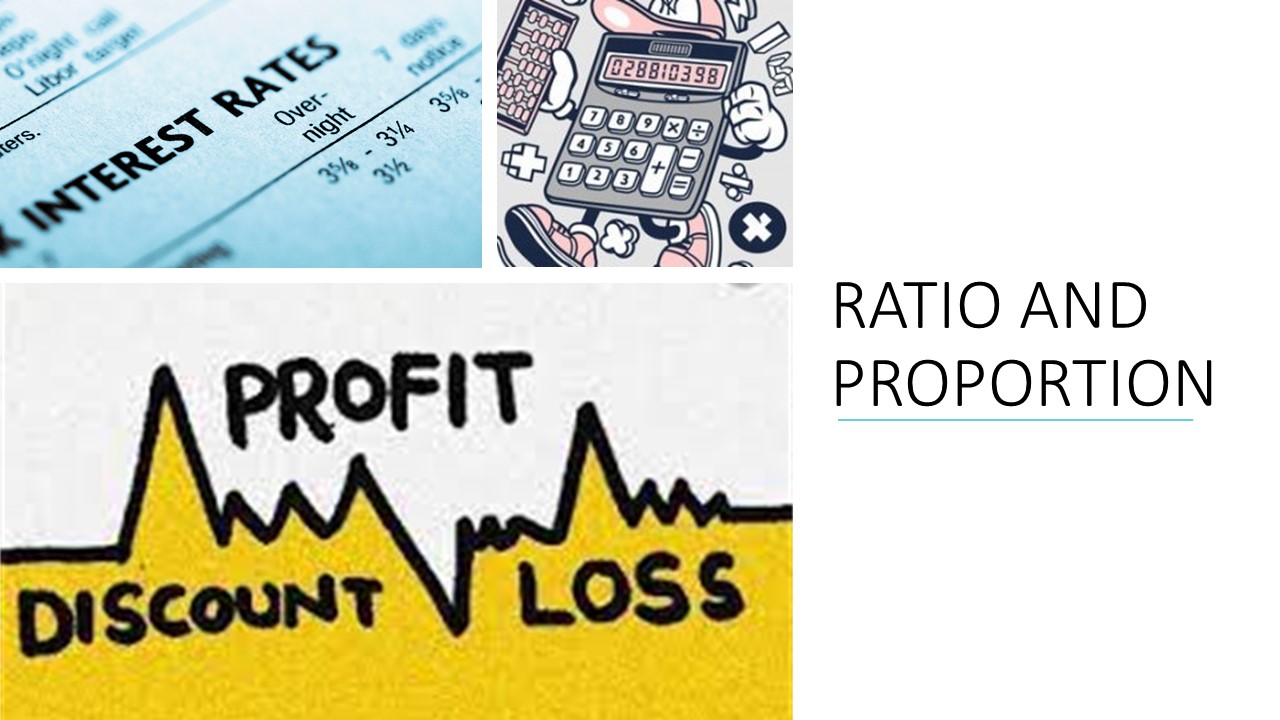Description
Profit, Loss, and Discount
When we buy a thing by paying some money and sell it back, then definitely we will be in either profit or loss. This profit and loss depends on selling and cost price.
Profit and loss is very useful in our daily life. Profit and loss can be seen very useful in field of business, finance and other transactions in our day to day life. It includes what % of total profit or total loss is gained. Both profit % and loss % are calculated on behalf of cost price.
Simple Interest
If a person with a bank account, credit card or bank loan will come across aspects of simple interest and compound interest. However, many people have difficulty in distinguishing between the two types of interest and how they should be calculated. In this course you will learn why simple interest is called simple interest, how simple interest is used in daily life and how it is calculated.
Compound interest, as the name implies, is a little more complicated but this course explains the concept clearly and covers the methods used for calculating compound interest
Direct and Inverse Variations.
For direct variation, use the equation y = kx, where k is the constant of proportionality. For inverse variation, use the equation y = k/x, again, with k as the constant of proportionality.
Direct and Inverse Variation
Direct variation describes a simple relationship between two variables. We say y varies directly with x if:
y=kx
Inverse Variation
Inverse variation describes another kind of relationship. We say y varies inversely with x ,if :
xy=k
Free
Free
Free access this course
-
LevelIntermediate
-
Total Enrolled4
-
Last UpdatedOctober 9, 2025
Hi, Welcome back!
Material Includes
- 🔥 Live Interactive classes with in-class doubt solving
- ⭐ Weekly Test and Quiz with instant tracking for progress
- ⚙️ Revision of the course after testing
- 👋 Fortnightly Parents and Tutor interactions
- 🌷 Expert monitoring of student's learning progress
- 👨👩👧👧 Daily communication over call, whatsapp and mail
- 💻3 hours on-demand video
- ✍4 downloadable resources
- ⌛Access for entire Academic Year
- 📱Access on mobile and Desktop
- 📋Assignments and review of the same
- 💡Tests and Correction by Board paper checkers
- 🏅Certificate of completion and Live tracking with Grade book
Course Duration:
0
Course level:Intermediate
Enrolled:4
About Course
In this section will learn this following chapters:
1.PROFIT ,LOSS AND DISCOUNT
2.INTEREST
3.DIRECT AND INVERSE VARIATION
Course Curriculum
PERCENTAGE
-
PERCENTAGE – CORE CONCEPT – INTERCONVESION OF PERCENTAGE, RATIO AND FRACTION DECIMAL
16:42 -
PERCENTAGE – CORE CONCEPT – WORD PROBLEMS BASED ON PERCENTAGE – PART A
06:49 -
PERCENTAGE – CORE CONCEPT – WORD PROBLEMS BASED ON PERCENTAGE – PART B
21:00 -
PERCENTAGE – PHYSICAL CLASS – NUMERICALS BASED ON PERCENTAGE PART I
15:37 -
PERCENTAGE- PHYSICAL CLASS – NUMERICALS BASED ON PERCENTAGE PART II
14:27 -
PERCENTAGE – PHYSICAL CLASS – NUMERICALS BASED ON PERCENTAGE PART III
06:57 -
PERCENTAGE- PHYSICAL CLASS – NUMERICALS BASED ON PERCENTAGE PART IV
09:54 -
PERCENTAGE – PHYSICAL CLASS – APPLCATION OF PERCENTAGE
20:51 -
PERCENTAGE – PHYSICAL CLASS – SUMS ON PROFIT AND LOSS – PART – I
23:00 -
PERCENTAGE – PHYSICAL CLASS – SUMS ON PROFIT AND LOSS CONITUED – PART -II
07:18 -
PERCENTAGE – PHYSICAL CLASS – SUM BASED ON DISTANCE TRAVELLED
07:23 -
PERCENTAGE – PHYSICAL CLASS – SUM ON DEPRECIATION
17:14 -
PERCENTAGE – PHYSICAL CLASS – SUM ON POPULATION
00:41 -
PERCENTAGE – PHYSICAL CLASS – SUMS ON PROFIT AND LOSS CONTINUED
20:44 -
PERCENTAGE – PHYSICAL CLASS – SUMS ON PROFIT AND LOSS CONITUED PART 2
07:18 -
PERCENTAGE – PHYSICAL CLASS – BASED ON PERCENTSGE PROFIT
11:31 -
PERCENTAGE – PHYSICAL CLASS – BASED ON GST
07:14
PROFIT ,LOSS AND DISCOUNT
-
PROFIT LOSS AND DISCOUNT – PHYSICAL CLASS – PROFIT AND LOSS
07:30 -
PROFIT LOSS AND DISCOUNT – PHYSICAL CLASS – NUMERICALS BASED ON PROFIT LOSS
25:14 -
PROFIT LOSS AND DISCOUNT – PHYSICAL CLASS – RELATION BETWEEN PROFIT OR LOSS PERCENT AND CP AND SP
03:47 -
PROFIT ,LOSS AND DISCOUNT – SUPPORT MATERIAL – MEASURING PROFIT AND LOSS
01:43 -
PROFIT LOSS AND DISCOUNT – PHYSICAL CLASS – CONCEPT OF DISCOUNT
10:05 -
PROFIT LOSS AND DISCOUNT – PHYSICAL CLASS – DISCOUNT CALCULATION WITH AND WITHOUT FORMULAE
13:51 -
PROFIT LOSS AND DISCOUNT – PHYSICAL CLASS – NUMERICALS BASED ON DISCOUNT
10:59 -
PROFIT, LOSS AND DISCOUNT – PHYSICAL CLASS – COMPLEX PROBLEMS ON PERCENTAGE GAIN
23:23 -
PROFIT LOSS AND DISCOUNT – PHYSICAL CLASS – HYBRID PROBLEMS ON DISCOUNT AND TAX
23:32 -
PROFIT AND LOSS – PHYSICAL CLASS – DISCOUNT
06:58 -
PROFIT AND LOSS – PHYSICAL CLASS – PROBLEMS BASED ON CP AND % LOSS OR PROFIT GIVEN
17:08 -
STATISTICS – PHYSICAL CLASS – INTERPRETATION OF PIE CHART
13:05 -
STATISTICS – PHYSICAL CLASS – PIE CHART INTERPRETATION
15:17 -
PROFIT LOSS AND DISCOUNT – REVISION CLASS – NUMERICALS
11:04:37
SIMPLE AND COMPOUND INTEREST
-
SIMPLE AND COMPOUND INTEREST – CORE CONCEPT – INTRODUCTION AND A FEW SUMS
29:19 -
COMPOUND INTERESTED – 08042022 – PHYSICAL CLASS – INTRODUCTION
11:13 -
SIMPLE AND COMPOUND INTEREST – SUPPORT MATERIAL – SIMPLE INTEREST
03:50 -
SIMPLE AND COMPOUND INTEREST – WITHOUT FORMULA – SUPPORT MATERIAL – COMPOUND INTEREST CALCULATION
01:14 -
SIMPLE AND COMPOUND INTEREST – SUPPORT MATERIAL – WITH FORMULA
02:26 -
COMPOUND INTEREST – 08042022 – PHYSICAL CLASS – NUMERICAL ON COMPOUND INTEREST WITHOUT FORMULA
29:07 -
COMPOUND INTEREST – PHYSICAL CLASS – 09042022 – MORE TYPES OF SUMS WITHOUT FORMULA
45:13 -
COMPOUND INTEREST – PHYSICAL CLASS – 090420222 – COMPOUND INTEREST WITH FORMULA
22:27 -
COMPOUND INTEREST – PHYSICAL CLASS – 09042022 – CONSECUTIVE YEARS WHEN AMOUNT IS GIVEN
12:05 -
COMPOUND INTEREST – 13042022 – PHYSICAL CLASS – FINDING RATE OF INTEREST
11:25 -
COMPOUND INTEREST – 21042022 – PHYSICAL CLASS – DIFFERENCE BETWEEN SIMPLE AND COMPOUND INTEREST
12:40 -
COMPOUND INTEREST – 21042022 – PHYSICAL CLASS – COMPOUND INTEREST WHEN RATE OF INTEREST CHANGES EVERY YEAR
08:33
DIRECT AND INVERSE VARIATION
-
DIRECT AND INVERSE VARIATIONS – PHYSICAL CLASS – INTRODUCTION TO DIRECT VARIATIONS
13:09 -
RATIO AND PROPORTION – SUPPORT MATERIAL – DIRECT AND INVERSE VARIATION
03:15 -
DIRECT AND INVERSE VARIATION – PHYSICAL CLASS – DIRECT AND INVERSE VARIATION LESS MORE METHOD
18:48 -
DIRECT AND INVERSE VARIATION – PHYSICAL CLASS – DIRECT AND INVERSE VARIATION TABLE
09:19 -
DIRECT AND INVERSE VARIATION – CORE CONCEPT – SOLVING BY CROSS MULTIPLICATION AND UNITARY METHOD
28:58 -
DIRECT AND INVERSE VARIATION – CORE CONCEPT – VARIATION INVOLVING 3 VARIABLES
07:56 -
DIRECT AND INVERSE VARIATION – PHYSICAL CLASS – INTRODUCTION
20:28 -
DIRECT AND INVERSE VARIATION – PHYSICAL CLASS – NUMERICALS ON DIRECT
07:50 -
DIRECT AND INVERSE VARIATION – PHYSICAL CLASS – NUMERICALS ON INVERSE
23:23 -
VIII – DIRECT AND INVERSE VARIATION – MAPS PLOTTING AND INVERSE VARIATION
47:17 -
VIII – DIRECT AND INVERSE VARIATION – TIME AND WORK BASED SIMPLE NUMERICALS
57:39
Student Ratings & Reviews

No Review Yet


